Meet Projecte Sèpia – Star Award winner 2022!
Boris Weitzmann receives the Star Award on behalf of Projecte Sèpia
On the 2nd of December, we awarded the Star Award winners 2021/22 during our ECST and Star Award Ceremony in the European Parliament. Keep on reading to learn more about Projecte Sèpia (ES), winner in the special “Innovation” Category!
The International Jury decided to create a special award on Innovation to acknowledge the originality of this conservation project and the strong cooperation with fishermen, schools and tourist business.
Projecte Sèpia – A community coming together to restore the marine environment
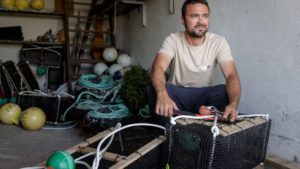
Local fisherman and gear, Projecte Sèpia
The Projecte Sèpia was born with the aim of improving the breeding conditions of cephalopods and repopulating the waters of the Empordà. Together with local, artisanal fishermen, the project wants to preserve traditional fishing and promote sustainable practices.
The Empordà bays struggle with a great decline of cuttlefish. This threatens the livelihoods of local fisherman and has gravitating social and environmental repercussions. The Sèpia project aims to ensure the reproduction of cephalopods and the incorporation of juveniles into the populations of the Empordà bays and raise awareness on the importance of the sea and sustainable tourism.
To support the dwindling cuttlefish numbers, scientists working in the project have installed underwater cuttlefish spawners (called Sepieres) made from branches in l’Escala and L’Estartit to create a protected place for cuttlefish and squid. This work is carried out together with local fishermen and technicians from the Montgrí-Medes Natural Park. These nurseries are then avoided by sailors and fishermen, favouring the reproduction of cuttlefish and squid.
Besides this action, artisanal fishermen have been coordinated to retrieve the cephalopod’s eggs that have been attached to their fishing gear and placed in incubator cages. This way the eggs can hatch normally and the youngsters incorporate to the biomass of the bays.
More than 1,5 million eggs have been saved in three years by these actions.
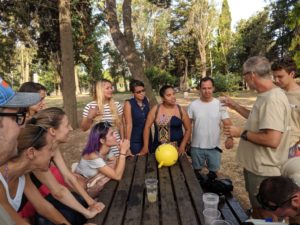
Educational Activities of Projecte Sèpia
Apart from active conservation and collaboration with local stakeholders, Projecte Sèpia is also part of the educational project ‘El Parc a l’Escola’ of the Parc Natural del Montgrí illes Medes and Baix Ter. They create activities for students and families like counting cuttlefish and squid eggs and presenting the Marine Protected Area. The education actions at the artificial spawners for the cuttlefish are carried out in places that are easily accessible on foot or by swimming from the beach. This way, each year more than 200 students from the Natural Park school have learned to value the Natural Park, artisanal fishing and local products.
In 2022 a tourist activity has started in which visitors sail on an ancient fishing boat to learn about traditional fishing, about the Projecte Sepia and about the MPA of the Natural Park.
Congratulations to Projecte Sèpia on their extraordinary work!
Meet Explore Iberia – Star Award winner 2022!
Explore Iberia received the Star Award at the European Parliament in Brussels
On the 2nd of December, we awarded the Star Award winners 2021/22 during our ECST and Star Award Ceremony in the European Parliament. Keep on reading to learn more about Explore Iberia (PT), winner in the “building my Community” Category!
Explore Iberia: bringing people and nature together
The International Jury awarded the tourism agency and activities provider Explore Iberia in the Building my community Category for their work as promoters of a consortium of local business
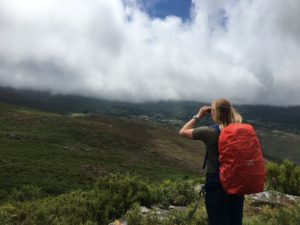
Experiencing the natural heritage, Explore Iberia
Is it possible for a business to practice local biodiversity conservation and restoration? It certainly is! Explore Iberia “adopted” a natural site, from Geoparque litoral de Viana, and plays an active role in the landscape restoration and conservation.
They are a small independent tour operator that is invested in providing visitors with an authentic experience in Northern Portugal and Galicia. The team of local experts have developed tours that incorporate their wealth of biodiversity and cultural heritage knowledge, and they provide full flexibility. Whether visitors want private tours, self-guided tours, flex-guided tours or to go solo – Explore Iberia allows each visitor to experience the region as they wish. They also have special offers for travellers that are blind or have low vision.
Their style of slow travel promotes sustainable practices and a deeper immersion into local cultural experiences.
When creating their activities, the team always makes sure to add a “cultural discovery moment”, where interpretation and experiencing the local culture play a key role. From corn bread workshops, to seaweed harvest or traditional pottery painting, visitors can experience the authentic culture of the region, whilst enjoying local food and drinks.
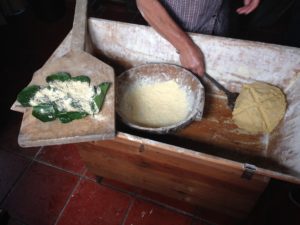
Discovering the local culture, Explore Iberia
The Explore Iberia team is well-established in the area and works together with a consortium of local businesses. They include them within their own tours, but also as joint stakeholders in the European Charter of Sustainable Tourism Forum in the Alto Minho region. They have also signed protocols with a university and two professional schools to offer internships and with the Employment and Professional Training Institute to train local young people that want to work as nature guides.
Through all these activities, Explore Iberia contributes to the cultural and social fabric of their community. EUROPARC congratulates Explore Iberia on their great work!
EUROPARC’s Seminar Dialogue with the European Commission 2022
Seminar Dialogue 2022
Following the successful Seminar-Dialogues organised in 2017, 2018, 2019, 2020 and 2021, on the 15 and 16th of November 2022 13 EUROPARC and Protected Areas representatives and 12 Officers from the European Commission met for a dialogue.
By bringing together representatives of the European Commission and Protected Area professionals, EUROPARC aims to put a spotlight on the contribution of Protected Areas to the achievement of the European policy goals, whilst giving the European Commission a clear insight of the challenges faced by professionals in the field.
‘Seminar Dialogue’ is an opportunity to give a voice to nature within the European commission and highlight the importance of Protected Areas.
• The new Restoration law: the role of, and the impact on, Protected Areas;
• Nature Conservation in the Climate change context
The programme, the report and the photo album are available here:
Programme Seminar Dialogue 2022
Photo Album Seminar Dialogue 2022
The event with the European Commission was anticipated by an internal networking meeting for EUROPARC members, on the 15th of November. It provided participants with the opportunity to share expectations from the Seminar with the Commission, to refresh their knowledge of the complex institutional structure of the EU, and discover how the EUROPARC Brussels Office interacts with the European key actors in its lobby and advocacy work.
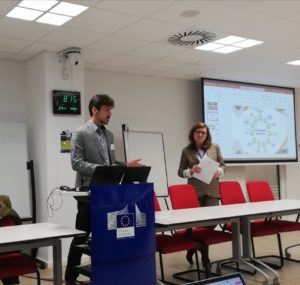
EUROPARC President Michael Hošek opens the 2022 Seminar Dialogue.
Restoration Law
The 16th of November started with a welcome from the (acting) Head of Unit D.3 – Nature Conservation, DG Environment, Luisa Samarelli and EUROPARC President Michael Hošek. Participants then received a quick update on the implementation of the EU Biodiversity Strategy for 2030 and a presentation of the Commission’s proposal of the new Nature Restoration law.
The proposal outlines that:
- by 2030 restoration measures will cover 20% of EU’s land and sea;
- by 2050, measures will be in place for ALL ecosystems in need of restoration.
The proposal of the law details the targets connected with the Habitats and Birds Directives, more other sectors/habitats, identified as essentials, e.i. the urban ecosystems. The text of the Commission’s Proposal for a Nature Restoration Law is available in English here.
The EU level PAF: Funding needs and opportunities for nature
Conservation and restoration need resources! Przemek Oginski, DG ENV, introduced the “EU level PAF: Funding needs and opportunities for nature”.
He introduced the estimations of the financial needs for Natura 2000 in the current EU long-term budget (also known as Multi-annual Financial Framework – MFF) running from 2021 to 2027. The Commission analysed if, and how, the financial resources devoted to biodiversity in different programmes were successful and effective. During the French presidency of the Council, an important proposal has been made, for a new large financial investment in nature protection and restoration for the next MFF.
Nature Restoration – The role of Protected Areas
The Protected Areas’ perspectives were introduced by, João Cardoso de Melo – from Cascais Ambiente (PT) – and member of the EUROPARC Council. He shared the results of the Siggen Seminar 2022 “Nature Restoration – The role of Protected Areas”, where 11 experts from all over Europe came together to discuss the role Protected Areas have to play in the restoration process. Over the course of two days, participants worked in teams to find answers to the questions:
- What are the benefits of nature restoration for communities?
- How can we implement nature restoration (from a governance perspective)?
- What are the key roles of Protected Areas (managers) in nature restoration? How can restoration projects be set up?
Finland’s Parks: experiences and lessons learnt in identifying restoration priorities and actions
Henrik Jansson, Director of Parks & Wildlife, Metsähallitus – (FI) presented the experiences of Finland’s Parks and lessons learnt in identifying restoration priorities and actions. For years, Finland has been engaged in habitat restoration. The topic is very important in the country, especially for the connection with the forestry sector, and one of the challenges is to find a compromise between conservation and economical use of the Finnish forest heritage.
White paper: Protected Areas and the European strategies for climate change adaptation and biodiversity
The EUROPARC Climate Change Task Force has been working on the preparation of the white paper: Protected Areas and the European strategies for climate change adaptation and biodiversity. The key messages were shared by Olivier De Sadeleer, project manager of the Natur’Adapt Project. Climate change defies us to take into account the big uncertainty on the future, in all strategies and actions for biodiversity, at all levels, inside and outside Protected Areas. These concepts are already included in the planning work of Brussels Environment Agency (BE) as showed in the presentation of the Case study: Climate change adaptation into the management of natural heritage sites, regional parks and forest in Brussels (BE)
Dialogue with the research and scientific sectors – NaturaConnect
The dialogue with the research and scientific sector is necessary for the implementation of the EU policies, especially in a climate change context. This will be one of the aspects of the new EUROPARC project ‘NaturaConnect’, introduced by the project manager Marit Schnepf.
Climate Policy Developments Relevant for Protected Areas
For the European Commission Perspectives, Peter Loeffler, DG CLIMA, shared an update about the Climate Policy Developments Relevant for Protected Areas. It is positive to note, that the decision makers in EU and at international level have started to agree about the connection on climate change, biodiversity and human health.
Guidance on climate change and Natura 2000
To support the Protected Area managers in dealing with climate change in Natura 2000 sites, the Commission is preparing a new guidance on climate change and Natura 2000. Participant Stefania Charisiadou, DG ENV, updated the participants about this process.
You can find all the presentations at the bottom of the page here.
Meet our Star Award Winner: Hotel Ristorante La Pieja
On the 2nd of December, we awarded the Star Award winners 2021/22 during our ECST and Star Award Ceremony in the European Parliament. Keep on reading to know the overall winner, Ristorante La Pieja!
Congratulations! Star Awards winner in the category “Global approach to sustainability”
The International Jury decided to award the Hotel Ristorante La Pieja (IT) as the overall winner of the STAR Awards 2021-2022 edition for their comprehensive approach to sustainability. Hotel Ristorante La Pieja has been the only one to candidate to all four categories with consistently strong performance across all four.
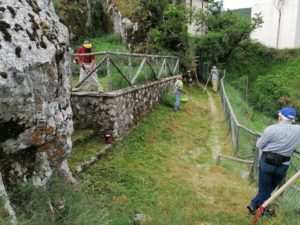
Trail cleaning done by La Pieja
The hotel and restaurant La Pieja wants to create an “Economy of well-being” centred around enjoyment and conservation of nature in the area of the Abruzzo National Park. To make that goal a reality, they have created an integrated offer for tourists, that includes
nature, culture and outdoor activities. All of this is done in close cooperation with other local operators, guides, and museums. La Pieja regularly meets with the Abruzzo Park Authority and local producers to create common objectives and commitments that ensure
adherence to ecological standards.
To create this “economy of well-being”, staff of the hotel also regularly participate in restoration activities. These range from removing waste along hiking paths, promoting the restoration of historical objects that are characteristic for the landscape, or creating educational workshops.
Furthermore, La Pieja actively promotes the nature and territory of the Abruzzo National Park.
They do so by providing brochures in the guest rooms and adding the Park’s offers to the bulletin board. Hotel staff also work on “education” visitors by distributing rules on how to behave in the natural area. Moreover, they organise special seasonal activities, for example walks during deer mating season, excursions to examine the traces left by different speciesof animals, or the fall photography contest, aimed at capturing the autumn landscape of
the Park.
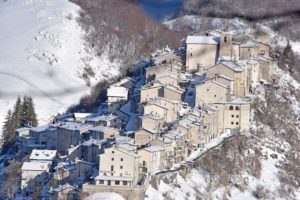
Hotel Restaurant La Pieja in its surroundings
Inside the hotel and restaurant, this attention to the needs of nature continue. The menu of the restaurant is composed of local and seasonal ingredients, some of which are ‘0 km produce’. The gardens surrounding the building are planted with native species, and only
eco-friendly fertilisers and insect detergents are used. Moreover, light pollution is kept to a minimum through the use of motion activated sensors. Attention is paid to the needs of the local community, to encourage moments of aggregation and promote the local economy.
All these efforts have led to the Hotel Ristorante La Pieja being our overall Star Award 2022 winner!